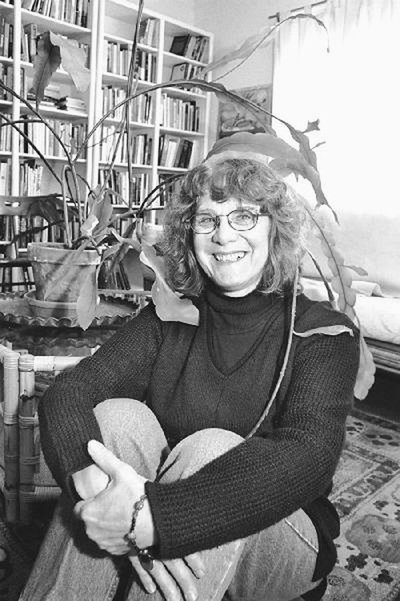May 30, 2002
Writing teacher honored for writing about teaching
Roberto Sanchez
Educational Outreach
Whenever Priscilla Long collects assignments from her writing students, there’s a name on the pile that pops up every time — her own.
“I do all the assignments I hand out in class. I’m subject to whatever happens,” said Long, a writing instructor with UW Extension for the past four years.
That teaching technique not only gets her students’ attention, but recently earned her the praise of national publishers. Long was recently showcased in Pass Fail (Kleidon Publishing, 2001), an anthology of essays and stories by 28 teachers who are also published writers. The authors were selected through a national contest.
Long’s essay, “Too Late for Miss Roselli,” is based on a personal disappointment at age 17, when she received a failing grade on a test about the French Revolution from one of her favorite teachers.
It is the latest essay in a four-page list of her published works, ranging from a 420-page history of coal mining in America (Where the Sun Never Shines: A History of America’s Bloody Coal Industry, Paragon House Publishers, 1989), to short stories and poems. It is also not the first of her own class assignments to end up in print. In fact, most of her essays and short stories started that way.
Long, who teaches personal essay writing at UW Extension, said doing her own assignments is one of the ways to keep writing during the school year, when most of her time goes toward teaching.
“It is the problem of a writing teacher to stay productive as a writer,” Long said. “By the start of the summer, I try not to teach, and pretty much by the end of summer I have finished all the pieces I originated during the year.”
It is also a way to improve her own writing
“Teaching really stimulates you as a writer,” she said. “As you are preparing your lessons, you are also looking once again at basic strategies and techniques and gaining more insight and more skill yourself.”
Joining her students in their assignments is also part of a larger teaching philosophy of leading by example. Long said she focuses on three things with her students: basic productivity, writing craft, and the use of contemporary models to improve technique.
But one of her most important teaching principles is to keep an open mind about her students’ abilities and motives for writing. This is a lesson she learned in part from the same teacher in the essay featured in Pass Fail. In that essay, Long describes her experience with Miss Roselli, a history teacher at the Moravian Seminary for Girls in Bethlehem, Pa, where she and her sister went to school as teenagers.
Long wrote that at age 17, she planned to become one of the “Great Minds of the West” by reading every thick book of the Western canon she could find. When Miss Roselli (“one of the adults who was very kind to me”) announced an upcoming test on the French Revolution, it became an opportunity to showcase that ambition. Long devoted herself to Edmund Burke’s Reflections on the Revolution in France and Thomas Carlyle’s History of the French Revolution, instead of the class textbook.
The day after the test, Long was shocked to see a red “F” on the cover, with the comments “how can you write about the French Revolution without mentioning Voltaire?”
The result? “I stopped reading books about the French Revolution. Instead I memorized the textbook,” she wrote. And she got an “A” on the next test.
“I don’t think she understood how important she was to me,” Long recalls. “I was 17. I was shocked. She could have called me in, told me ‘You are 17 and way over your head.’ She didn’t say anything. She just gave me an ‘F’.”
Despite this experience, Long went on to read more Great Books, eventually becoming a writer and a teacher. Her first big book was, of all things, a history book. And she learned that there’s much more to teaching than just putting out facts for students to absorb.
“I never say, ‘This is a mess’. That’s not my business to do, that’s not what I’m here to do,” Long said. “My mission isn’t to tell somebody that they can’t be a writer or that they are not good enough. . .You can’t tell how good a writer is going to be five years from now.”
Long is planning to spend this summer finishing her next book, a study of women artists and creativity from 1870 to the present.



